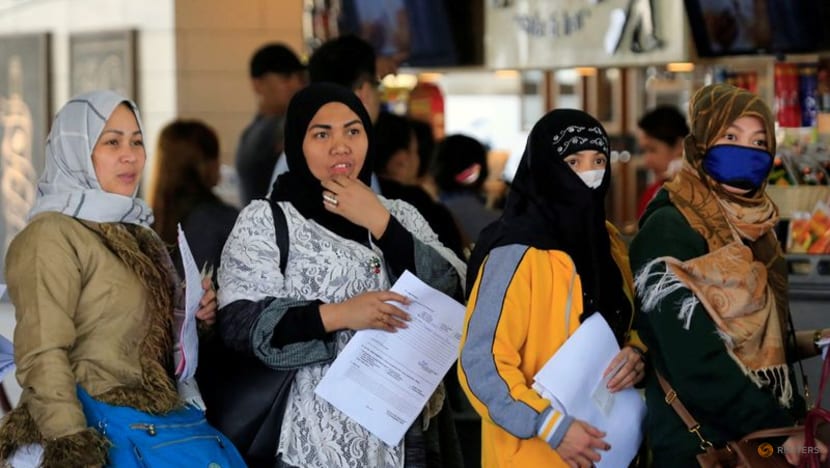The Philippines relies on remittances to prop up the local economy. But the reports of abuses cannot be ignored, says this Manila-based journalist.

MANILA: Standing to deliver a State of the Nation Address last month, a year after assuming office, Philippine President Ferdinand Marcos Jr triumphantly announced he had solved a “deployment issue” involving Filipino workers in the Kingdom of Saudi Arabia.
Unpaid salaries and other related claims of about 14,000 overseas Filipino workers “are now being processed”, Marcos declared, a controversy stemming from those put out of work in Saudi Arabia during the pandemic.
“The Crown Prince of the Kingdom of Saudi Arabia himself personally committed to me that the unpaid claims of Filipino workers would now be paid,” Marcos said.
The treatment of overseas Filipino workers is hugely sensitive politically, amid regular claims of mistreatment and the importance of this considerable diaspora sending money home. The numbers involved are huge. Marcos said “as of today, 70,000 of our (overseas Filipino workers) have already been deployed to Saudi Arabia for employment”, with another 50,000 workers at least working as seafarers aboard European Union ships.
But advocacy groups were quick to point out that Marcos’ boasting was hollow and that many returning workers from Saudi Arabia had been told by authorities that no payments were in the works.
The episode also reinforced an often-ignored context, that increased overseas deployment of labour isn’t a solution, it’s a symptom of a problem. This pre-dates Marcos’ government (but he hasn’t properly addressed it) and may yet grow worse.
RECORD REMITTANCES
The Philippines is one of the leading exporters of labour. According to the World Bank, the Philippines had the world’s fourth-highest remittance inflows in 2021. The following year, remittances broke records by making up 8.9 per cent of the country’s gross domestic product.
According to the Philippine Statistics Authority, Saudi Arabi is the number one destination for Filipino workers. Combined with its neighbours, the Gulf countries host almost half of all 1.83 million overseas Filipino workers. The numbers are so many that the abbreviation OFWs is common parlance in Philippines.
Marcos has spent much of his time abroad since winning office, courting foreign investment from 13 countries in the last 12 months, with many of the Gulf states clearly in his sights. In January, he eyed breakthrough trade deals, admitting that the huge presence of Filipino labour would be crucial to his negotiating strategy.
Marcos can’t afford to lose the revenue from overseas workers. This is crucial to his claim in his speech of the Philippines having the “highest growth rate in 46 years”.
But without the US$32.5 billion in remittances Marcos claims to the economy from overseas Filipino workers, attention would fall on the dark side of the national accounts – the country holds top spot for inflation in Southeast Asia, as well as the region’s highest unemployment rate and largest food trade deficit.
Without the contribution of overseas workers, Marcos’ economic competency would be increasingly called into question. He is the first president to oversee the new Department of Migrant Workers (DMW), an entire agency dedicated to fast-tracking labour export. By mid-year, the DMW reported having already exceeded the personnel deployment of 2020 and 2021, much to Marcos’ glee.
WORKER ABUSE SPARKS BACKLASH
But when headlines sour – such as Abused Filipino Workers Trafficked To Syria or Murder Of Filipina worker In Kuwait – Marcos himself seems to disappear. Instead, he encourages Filipinos to grab the opportunities of Saudi Arabia’s “building boom”.
Periodic reports of worker abuse, of passports being confiscated, modern-day slavery, human trafficking or even deaths haven’t deterred the government from continuing to urge a stream of deployment to these countries.
In his State of the Nation Address, Marcos said nothing substantive about the misery that hundreds of Filipinos endured at the hands of conniving employers. Only that these workers “continue to send in historically high remittances, solidifying their role in our transformative economic growth” while pledging to engage “with our partners in the international community to ensure a safe working environment”.
Yet high profile cases of abuse continue. The body of a Filippino domestic worker Jullebee Ranara was found in the Kuwaiti desert in January – the latest in a string of cases involving Filipinos killed in the country.
Incidents like these spark backlash. When the noise becomes too much, the government will impose a temporary ban on visas, as has happened with Kuwait in recent months, and issue diplomatic complaints. But it’s become all too routine, an incident eventually dismissed and forgotten until the next inevitable employment dispute or display of brutality.
This back and forth underpins a persistent problem: That overseas Filipino workers are too often unsafe and yet the government’s economic ambition requires them to be so.
“It is our wish that one day foreign employment will be driven by choice, not by necessity,” Marcos said in his speech, recognising this requires “great sacrifice from them, their families, and their communities”. So, the government then has a corollary duty to ensure people are not in harm’s way.
